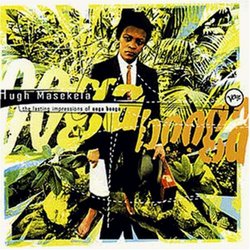| All Artists: Hugh Masekela Title: The Lasting Impressions Of Ooga Booga Members Wishing: 2 Total Copies: 0 Label: Polygram Records Original Release Date: 6/18/1996 Release Date: 6/18/1996 Genres: International Music, Jazz, Pop Styles: Africa, Jazz Fusion, Soul-Jazz & Boogaloo Number of Discs: 1 SwapaCD Credits: 1 UPC: 731453163027 |
Search - Hugh Masekela :: The Lasting Impressions Of Ooga Booga
 | Hugh Masekela The Lasting Impressions Of Ooga Booga Genres: International Music, Jazz, Pop
|
Larger Image |
CD Details |
CD ReviewsReady For The World David Wayne | Santee, CA United States | 06/27/2000 (5 out of 5 stars) "When I was still counting my years on two hands, Hugh Masekela was making a bold impression, indeed, on America, topping the U.S. pop chart with "Grazing In The Grass." It's flipside also made an impression on me. "Bajabula Bonke" was the first song of African origin I ever listened to at length. Without understanding the words or their exact meaning (I was 8), I was touched by the spirit of the storyteller that is so much a part of African history. It also featured a kind of rhythm I'd never encountered before; very much unlike what prevailed in those days on Black radio. This album, recorded about three days earlier, contains a live performance in New York City by a very young Masekela, including a less-polished version of "Bajabula Bonke." Hugh was still married to Miriam Makeba at this time, and he learned many songs from her (Makeba's mother was an asongoma, one who told stories/history through song). Masekela is not yet a master on this set, which is preserved here as one performance (the original release on vinyl was divided onto two albums), but he is already a journeyman soloist. He has a vision, and he and his combo are fleshing it out as they go along. This album is the root of the World Beat movement as we know it. Masekela and company are combining elements of Africa, Cuba, South America, and good ol' American Jazz into a new form; a form which could truly traverse the world. I think Hugh wanted to make an impact, so the first five cuts on this performance seem strongest. But there are other fine performances, like on "Masquenada." He displays fine range and good mechanics as a singer, which has always been a very underrated part of his game. Listen to Hugh's version of "Canteloupe Island" and compare it to the hugely popular hip-hop version of a few years ago. Hugh definitely made an impact. It has taken years, but Hugh has remained true to his roots and his causes, and is highly respected worldwide. If you want to hear his sound fully realized, seek out his album, "Tomorrow." This CD shows you the process of creative alchemy. Hugh Masekela takes Manhattan and shows that he is ready for the World. If you want to hear some of these same songs in a more traditional South African style, check out Miriam Makeba's late 80s release, "Sangoma."" Impress this... hey rat | Oakland, CA USA | 04/05/2002 (5 out of 5 stars) "One of the biggest pain points of any musician is hearing some rank-amateur in the crowd complain that they didn't perform with enough proficiency to rank them up with their dutiful critic's standards. They are missing the point of live performance. But, then again, none of these nay-sayers have ever had to pick up a horn and play in their entire life.This CD (dad's LP when I first spun it) defined live performance for me as a kid. Yea, ther might be a few subtle gaffs here and there, but they are in context with the music. This is more of an inflexion than a mistake. Score Masekela: 1, Grumpy Pundit: 0.The depth of the recording itself makes it one of my favorites on my CD rotation. It certainly captures the ambiant refelctions of a smokey NYC nightclub that is The Village Gate. If you close your eyes, you can almost see the skinny black ties and dark sunglasses. Try not to pass this off as lounge fodder. You'll be making a gross error in judgement." Unpolished gem hey rat | 01/12/1999 (4 out of 5 stars) "Delivered with Hugh Masekela's soft, polite intros, and countered by his exuberant, staccato trumpet playing style, this album is a wonderful, in the pre-"world music" age, blend of american jazz and traditional south african musical influences. Some important particulars: It is a live recording in 1965 with a playing time of 78 min. 42 sec. Being a live recording lends this album a nice spice which easily offset any recording imperfections. If you're like me, you'll even enjoy Hugh's singing on the Miriam Makeba tunes Bajabula Bonke, Ozinorabiro, and Abangoma. Paradoxically, it may be a Makeba instrumental which is the sweetest, more remembered tune -- Unhlanhia. It is placed, unfortunately, right before Herbie Hancock's Cantaloupe Island and both songs have a similar feel. But that is a delicious auditory burden. If you like Hugh Masekela and you don't have this CD, get it. If you want to try the Masekela horn style this is a good introduction. Don't let the awkward CD title dissuade your interest."
|

 Track Listings (13) - Disc #1
Track Listings (13) - Disc #1